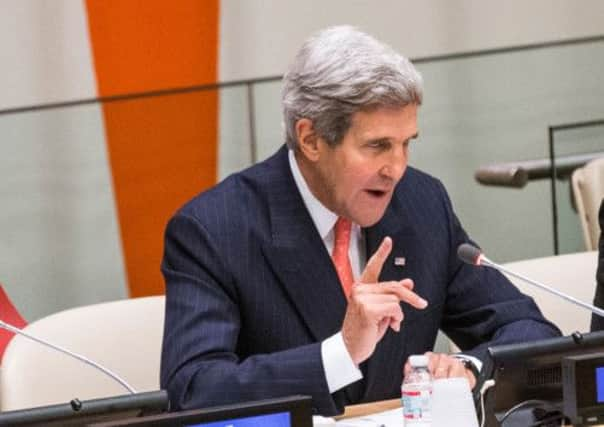UN reaches deal on Syria weapons resolution


The draft resolution’s demands that Syria abandon its chemical stockpile and allow unfettered access to chemical weapons experts are legally binding. But if Syria fails to comply, the council will need to adopt a second resolution to impose measures under Chapter 7 of the UN Charter, which allows for military and non-military actions to promote peace and security.
The agreement represents a breakthrough for the security council and rare unity between Russia, which supports Syrian president Bashar Assad’s government, and the United States, which backs the opposition.
Advertisement
Hide AdAdvertisement
Hide AdRussia and the United States jointly introduced the text to the 10 non-permanent council members, supported by the other permanent members Britain, France and China. A vote on the resolution depends on how the full council responds to the draft and on how soon an international group that oversees the global treaty on chemical weapons can adopt a plan for securing and destroying Syria’s stockpile.
The spark for the recent flurry of diplomatic activity was the August 21 poison gas attack that killed hundreds of civilians in a Damascus suburb and President Barack Obama’s threat of US strikes in retaliation.
After US secretary of state John Kerry said Assad could avert US military action by turning over “every single bit of his chemical weapons” to international control within a week, Russia quickly agreed.
‘Large chemical weapons programme eliminated’
Mr Kerry and Russian foreign minister Sergey Lavrov signed an agreement in Geneva on September 13 to put Syria’s chemical weapons under international control for later destruction, and Assad’s government accepted.
“Just two weeks ago, tonight’s outcome seemed utterly unimaginable,” US ambassador Samantha Power said after the security council meeting. “Two weeks ago the Syrian regime had not even acknowledged the existence of its chemical weapons stockpiles.
“If implemented fully, this resolution will eliminate one of the largest previously undeclared chemical weapons programmes in the world.”
Britain’s UN ambassador Sir Mark Lyall Grant and a senior US State Department official described the draft resolution as “binding and enforceable”.
But the draft resolution makes clear there is no trigger for enforcement measures if Syria fails to comply. The Russian, US and British ambassadors confirmed that this would require a second resolution.
Advertisement
Hide AdAdvertisement
Hide AdBut Sir Mark said the strong language in the text - that the council “decides” that the security council will “impose measures under Chapter 7 of the United Nations Charter” in the event of non-compliance - requires members to act.
Negotiations on the draft resolution were tough, especially on the Chapter 7 issue. Russia and China have vetoed three previous Western-backed resolutions aimed at pressuring Assad to end the violence, but the chemical weapons attack proved to be a turning point.
Sir Mark called the draft “a ground-breaking text” because for the first time it would make a determination that “use of chemical weapons anywhere constitutes a threat to international peace and security”, which sets a new international norm.
In a clear reference to Russia, he added: “If Assad thought he could hide behind certain members of the security council, he will have to think again.”
Sir Mark said Britain would have liked much stronger language on the abuse of human rights by the regime and a decision by the council to refer perpetrators of chemical weapons attacks to the International Criminal Court to be prosecuted for war crimes. Diplomats said this was discussed but Russia objected.
As a result, the draft says only that the security council “expresses its strong conviction that those individuals responsible for the use of chemical weapons in the Syrian Arab Republic should be held accountable”.
The draft resolution would ban Syria from possessing chemical weapons and condemn “in the strongest terms” the use of chemical weapons in the August 21 attack and any other use. It also would ban any country from obtaining chemical weapons, or the technology, or equipment to produce them from Syria.
‘Political transition’
It authorises the UN to send an advance team to assist the Organisation for the Prohibition of Chemical Weapons’ activities in Syria and and asks secretary general Ban Ki-moon to submit recommendations to the security council within 10 days of the resolution’s adoption on the UN role in eliminating Syria’s chemical weapons programme.
Advertisement
Hide AdAdvertisement
Hide AdThe council would review compliance with the OPCW’s plans within 30 days and every month after that.
The draft resolution strongly backs a political transition in Syria. It would for the first time endorse the road map for a transition adopted in June 2012 in Geneva by key nations, and call for an international conference to be convened “as soon as possible” to implement it.
The road map starts with the establishment of a transitional governing body by mutual consent with full executive powers and ends with elections - but there has been no agreement on how to implement it, which would require Assad to relinquish power at some point.
The draft also calls on “all Syrian parties to engage seriously and constructively” at a new Geneva conference and be committed “to the achievement of stability and reconciliation”.